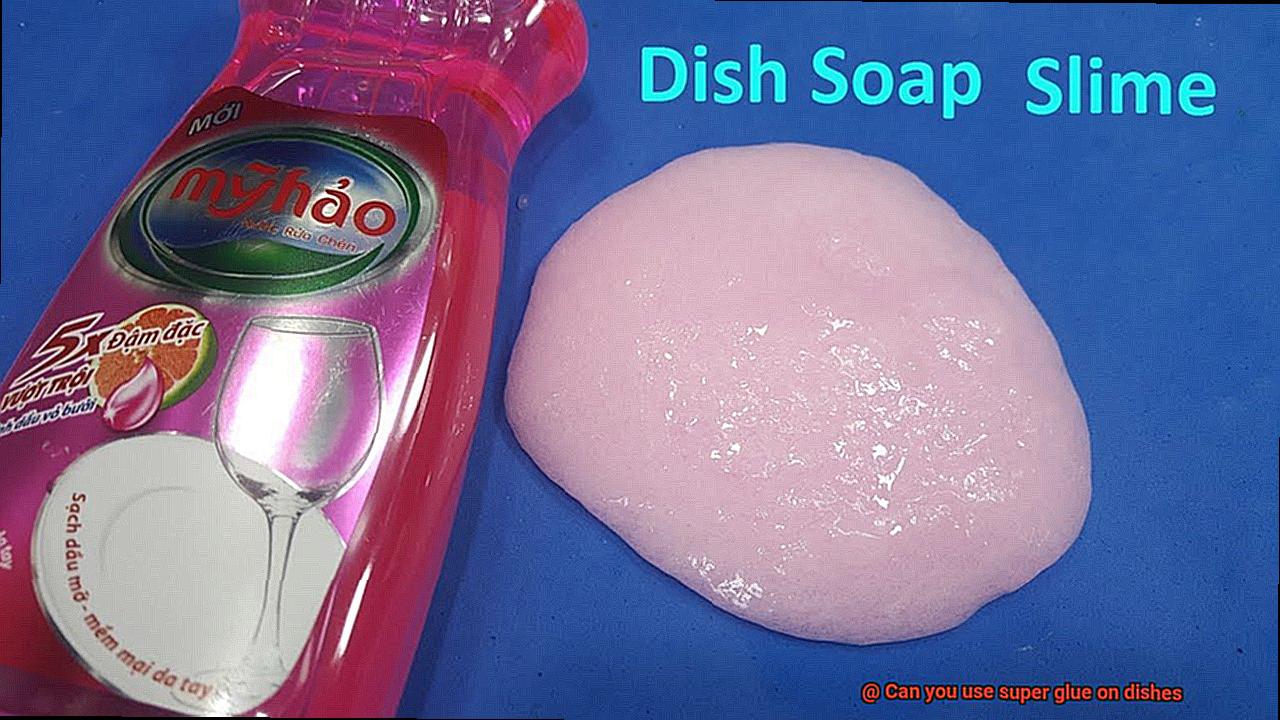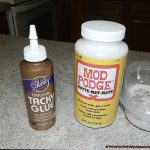Picture this: you’re holding your favorite dish, the one that brings back memories of cozy Sunday brunches and laughter-filled dinner parties. And then, disaster strikes. It slips from your fingers, crashes to the ground, and shatters into a million heart-wrenching pieces. We’ve all been there.
But fear not, fellow dish enthusiasts and accident-prone individuals. There might just be a hidden hero in your kitchen drawer – super glue. Yes, you heard that right. In this blog post, we’re diving headfirst into the captivating world of using super glue on dishes. Is it a magical solution or a recipe for disaster? We’ll uncover the secrets behind successful repairs and reveal the do’s and don’ts of this intriguing craft.
So grab your broken bowls and chipped plates, because we’re about to embark on an adventure through shattered porcelain and the potential wonders of super glue. Get ready to unleash your inner repair genius as we explore whether super glue can truly save our beloved tableware from the brink of destruction.
Considerations for Using Super Glue on Dishes
Contents
- 1 Considerations for Using Super Glue on Dishes
- 2 Types of Materials for Dish Repair
- 3 Adhesives to Avoid on Dishes
- 4 Intended Use of the Dish
- 5 Temperature and Moisture Resistance of Super Glue
- 6 Safety Concerns with Super Glue
- 7 Specialized Adhesives for Ceramic and Glassware
- 8 Professional Advice on Choosing the Right Adhesive
- 9 Conclusion
In the world of dish repair, super glue may seem like a quick and convenient solution. However, before you embark on a journey of adhesive bonding, it is crucial to understand the potential risks involved. This article will delve into the important considerations for using super glue on dishes, ensuring your safety and the durability of your beloved tableware.
Chemical Leaching:
Super glue is not specifically designed for food-contact surfaces, and it contains chemicals that can leach into your food or drinks. These chemicals pose a risk to your health if ingested. To prioritize your loved ones’ safety, avoid direct contact between super glue and food-contact areas.
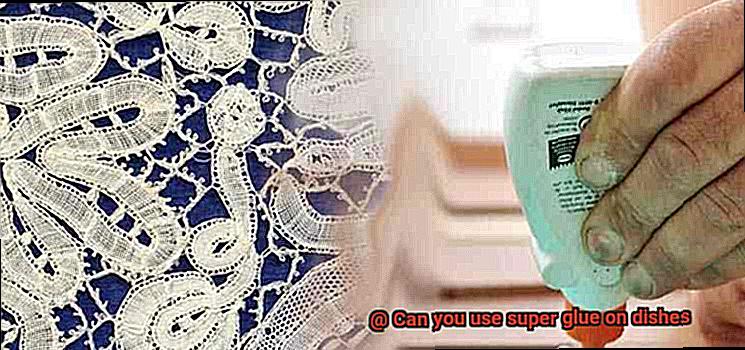
Drying and Curing Time:
Patience is key when dealing with super glue. It needs time to dry and cure properly before it’s safe to use on dishes. The curing process can take hours or even days, depending on the brand and type of super glue used. Rushing this process compromises the strength and longevity of the repair.
Compatibility Testing:
To prevent any unwanted surprises, perform a compatibility test before applying super glue to the entire dish. Apply a small amount of glue to an inconspicuous area to assess how it interacts with the material. This step ensures that the glue doesn’t affect the appearance or functionality of the dish.
Cracks and Fractures:
Consider whether super glue alone will provide a strong and long-lasting bond for dishes with cracks or fractures. In some cases, additional reinforcement such as epoxy resin or a food-safe adhesive may be necessary to ensure a secure repair that can withstand regular use.
Temperature Resistance:
Dishes often encounter high temperatures, whether in the oven or microwave. Not all super glues can handle extreme heat, so it’s crucial to choose a heat-resistant variant if you plan to use the dish in these conditions. Failure to do so may result in the glue breaking down or releasing toxic fumes.
Surface Preparation:
Preparation is key for a successful bond. Thoroughly clean and dry the dish before applying super glue. Any grease, oil, or residue on the surface can interfere with the bonding process, leading to a weak bond that may fail over time.
Acid Resistance:
If your dish will come into contact with acidic foods such as citrus fruits or vinegar-based dressings, ensure that the super glue you use is resistant to acid. Some types of super glue may degrade or dissolve when exposed to acidic substances. A compromised repair not only affects the dish’s longevity but also risks contaminating your food.
Types of Materials for Dish Repair
It’s like watching a piece of your heart break. But don’t despair. There is hope for your beloved dish. However, when it comes to repairing your dishes, it’s crucial to choose the right adhesive. In this blog post, we will delve into the world of dishware materials and their compatibility with super glue. Let’s explore the possibilities.
Ceramic – A Fortress of Strength:
Ceramic dishes are renowned for their durability and versatility. They can withstand the test of time, but accidents happen. Fortunately, super glue is generally compatible with ceramic dishes, forming a bond that is as strong as steel. However, it’s essential to select a non-toxic and food-safe glue since the repaired dish will come into contact with food.
Porcelain – Delicate Beauty:
Porcelain dishes exude elegance and charm, but their delicate nature requires special attention during repairs. Super glue can be used on porcelain, but it may not yield optimal results. The smooth and non-porous surface of porcelain poses a challenge for adhesive adherence. To ensure a flawless repair, it is best to use specialized porcelain repair adhesives that are designed to conquer these slippery surfaces.
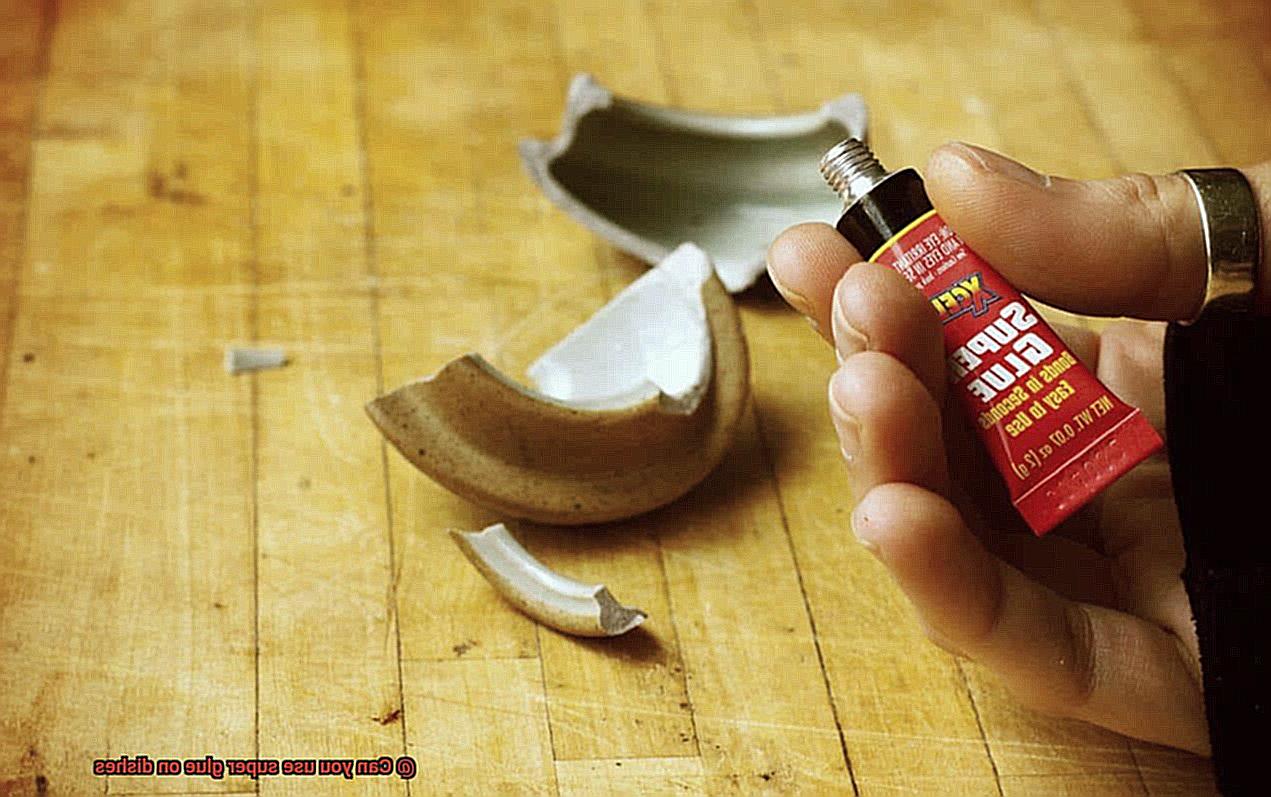
Glass – The Slippery Slope:
Glass dishes add a touch of sophistication to any table setting, but their sleek surface can make them tricky to repair. While super glue can bond glass, it may not be the ideal choice due to its smooth and slippery nature. To achieve seamless repairs, it’s advisable to opt for clear glass adhesive or invest in a specialized glass repair kit that knows how to conquer these slippery slopes.
Stoneware – A Warrior’s Armor:
Stoneware dishes are built like fortresses, known for their strength and resistance to chipping. Super glue can be used on stoneware, but caution should be exercised when selecting the adhesive. If the repaired dish will be used in the oven or microwave, it’s crucial to choose an adhesive that can withstand high temperatures. Additionally, stoneware’s rough or textured surface demands extra care during the repair process to ensure a flawless outcome.
Melamine – The Lightweight Warrior:
Melamine dishes are lightweight yet durable, perfect for everyday use. When it comes to repairing melamine dishes, super glue can prove to be a reliable ally. However, it is imperative to choose a non-toxic adhesive specifically formulated for melamine. This material can be prone to chipping and cracking, so handle the repair process with utmost care and precision.
Adhesives to Avoid on Dishes
When it comes to repairing dishes, it’s important to choose the right adhesive to avoid any potential health risks. Certain adhesives should be avoided because they can contaminate the food that comes into contact with them. Let’s take a closer look at which adhesives you should steer clear of.
First on the list is super glue, also known as cyanoacrylate adhesive. While super glue is famous for its strong bonding properties, it’s not designed to be food-safe. The toxic chemicals in super glue can leach into your food and pose a risk to your health.
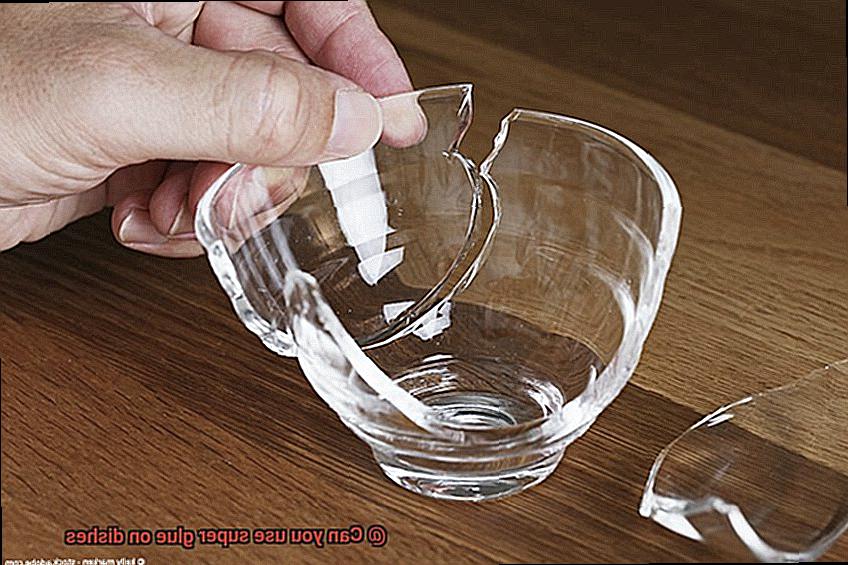
Next up is epoxy adhesive. This adhesive is commonly used for its excellent bonding strength, but it’s not suitable for use on dishes. Epoxy contains harmful chemicals that can seep into your food and turn your dinner into a chemistry experiment gone wrong.
Another adhesive to avoid is contact cement. Although it may be great for bonding various materials, contact cement is definitely not safe for use on dishes. The chemicals in contact cement can contaminate your food and leave you with more than just a satisfied belly.
Last but not least, we have hot glue. While hot glue is a trusty sidekick for crafters everywhere, it’s a big “no thank you” when it comes to dishes. The high temperatures required to melt hot glue can release toxic fumes that can make your food taste like a chemistry lab.
So what’s the solution? Opt for adhesives that are specifically labeled as food-safe or approved for use on dishes. These adhesives are made with safe and non-toxic materials that won’t contaminate your food. They’re like the superheroes of the glue world, swooping in to save the day and keep your meals delicious and safe.
In conclusion, when repairing dishes, avoid using super glue, epoxy, contact cement, and hot glue. These adhesives may be great for other projects, but they’re not meant for your precious dinnerware. Instead, choose adhesives that are specifically designed for food contact. Your taste buds will thank you.
Intended Use of the Dish
We’ve all experienced that heart-sinking moment when our favorite dish shatters into pieces. The temptation to reach for super glue and quickly fix it is strong, but before you do, let’s talk about why considering the intended use of a dish is so important. We want our repaired dishes to not only look good but also be safe for our food.
Potential Risks:
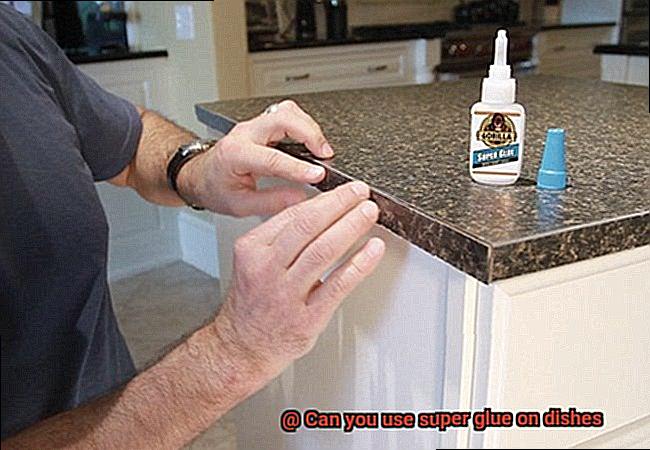
Using super glue on dishes can pose several risks. First and foremost, super glue is not food-safe. It contains chemicals that can leach into the food, turning your dinner into a chemistry experiment gone wrong. Additionally, super glue may not hold up well under heat or moisture, which are common in the kitchen. This can lead to the glue deteriorating over time and the dish breaking apart again.
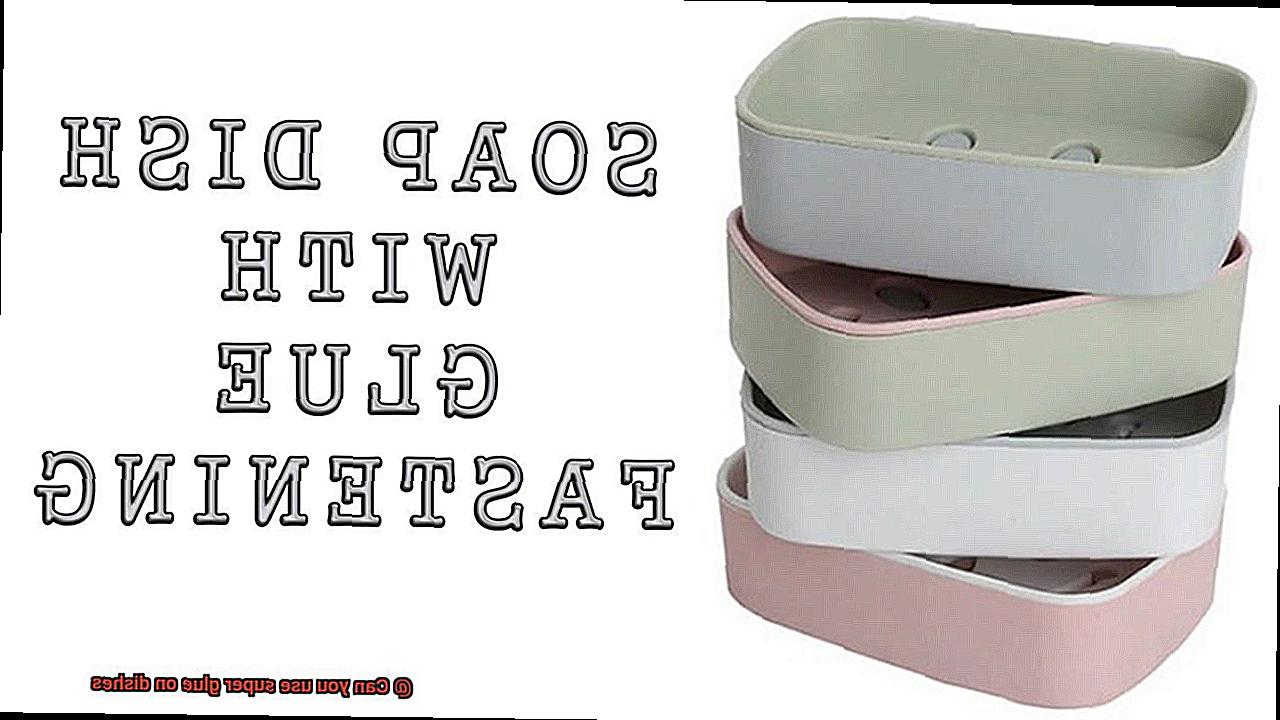
Alternative Options:
Instead of using super glue on dishes, there are specialized ceramic or glass adhesives available that are specifically designed for food-safe applications. These adhesives bond dishes together without compromising safety or functionality. They can withstand high temperatures and repeated washing, ensuring your repaired dish remains intact during regular use. These food-safe adhesives are like superheroes swooping in to save the day and keep your meals delicious and safe.
Consulting Professionals:
When it comes to repairing dishes, sometimes it’s best to leave it to the experts. If you’re uncertain about whether it’s safe or feasible to repair a particular dish using adhesives, consult professionals with expertise in dish repair or restoration. They can provide guidance based on their knowledge and experience, ensuring your dishes are repaired properly without compromising safety or functionality.
Temperature and Moisture Resistance of Super Glue
Before you throw in the towel, let’s dive into the fascinating world of super glue and explore its temperature and moisture resistance when it comes to dish repair.
Super glue, also known as cyanoacrylate adhesive, is a popular choice for bonding various materials due to its fast-drying and incredibly strong adhesive properties. But when it comes to using it on dishes, there are a few things you need to know.
First and foremost, it’s essential to note that super glue is not recommended for use on dishes that will be exposed to high temperatures, such as those used in the oven or microwave. The heat can weaken the bond and even cause the glue to break down, potentially releasing toxic fumes into your food. Definitely not the kind of flavor you’re looking for.
However, don’t despair just yet. If you have a dish that will only be used for serving cold or room temperature food, super glue can still be your knight in shining armor for repairing those minor cracks or chips. Just make sure to clean and dry the surface thoroughly before applying the glue. Any lingering grease, oil, or moisture can interfere with the adhesive’s ability to bond effectively.
Now, here’s a little secret to enhance the durability of the bond: consider roughening the surface of the dish with some sandpaper before applying the super glue. This creates a better surface for the adhesive to grip onto, ensuring a stronger hold. However, keep in mind that this technique may not be suitable for all types of dishes, so exercise caution and test it out on a small inconspicuous area first.
If you’re seeking a more specialized solution, fear not. There are food-safe adhesives available that are specifically formulated for use on dishes. These magical potions are designed to withstand higher temperatures and prolonged exposure to moisture without compromising your food’s safety. So if you’re unsure about using super glue on your precious dishware, consider these specialized options instead.
Safety Concerns with Super Glue
Super glue, the superhero of adhesives, can save the day when it comes to repairing broken dishes. However, before you embark on your mission to rescue your favorite plate or mug, it’s crucial to be aware of the safety concerns associated with using super glue on dishes. In this blog post, we’ll explore these concerns and provide you with tips to ensure your dish repairs are both effective and safe.
Safety Concerns:
- Chemical Composition: Super glue contains potent chemicals that can be harmful if ingested or come into contact with your skin, eyes, or mouth. Handle it with care and keep it away from children and pets.
- Drying and Curing Time: For the safety of your dishes, ensure the super glue is completely dried and cured before using them for food or drink. Inadequate drying or curing can release toxic fumes or leach chemicals into your food or drink, posing a health risk.
- Manufacturer’s Instructions: Always follow the manufacturer’s instructions carefully when using super glue on dishes. Each brand may have different recommendations regarding drying and curing time, so read and adhere to them.
- Direct Contact with Food or Drink: Super glue is not suitable for surfaces that directly touch food or drink. For such repairs, consider using food-safe adhesives specifically formulated for dish repair.
Tips for Safe Dish Repairs:
- Clean and Dry Surfaces: Thoroughly clean and dry the dish surface before applying the super glue. Grease, oil, or moisture can interfere with its effectiveness.
- Surface Roughening: Gently roughen the dish’s surface with sandpaper for stronger adhesion. However, test this technique on a small area first, as it may not be suitable for all types of dishes.
- Temperature Considerations: Avoid subjecting super glue-bonded dishes to high temperatures, such as those from an oven or microwave. Heat can weaken the bond and potentially release toxic fumes into your food.
- Seek Professional Help: For significant cracks or breaks, consult a professional for repair instead of attempting to fix it with super glue. Professionals have the expertise and materials necessary for safe and durable repairs.
Specialized Adhesives for Ceramic and Glassware
Specialized adhesives for ceramic and glassware are essential for repairing or bonding fragile items made of these materials. These adhesives offer unique properties that ensure a strong and long-lasting bond, making them ideal for various applications.
One popular adhesive for ceramic and glassware is epoxy resin. This two-part adhesive consists of a resin and a hardener that, when mixed together, create a strong and durable bond. Epoxy resin is known for its excellent bonding properties and resistance to water and heat. It is transparent, making it perfect for bonding transparent or translucent glassware.
Silicone adhesive is another great option for ceramic and glassware. This flexible adhesive provides a strong bond that can withstand high temperatures. Silicone adhesives are commonly used for sealing gaps or attaching handles to ceramic or glass pots and pans. They are also resistant to water, ensuring the bond remains intact even when exposed to liquids.
For delicate ceramic or glassware, such as decorative items or fine china, cyanoacrylate glue, also known as super glue, is often used. Super glue is a fast-bonding adhesive that forms an instant bond when it comes into contact with moisture. It is important to choose a specialized formula designed specifically for ceramics or glassware to ensure optimal bonding strength and resistance to moisture.
When using these specialized adhesives, it is crucial to clean the surfaces thoroughly before applying the adhesive. Removing any dirt, grease, or residue ensures a proper bond. Apply the adhesive sparingly and evenly, covering the entire bonding area. Patience is key when using these adhesives as they need time to cure fully before the item can be used or washed.
Professional Advice on Choosing the Right Adhesive
Restoring your beloved dishes to their former glory requires the right adhesive. This comprehensive guide will help you navigate the factors involved in selecting the perfect adhesive for your dish repair needs. From material compatibility and bond strength to temperature resistance and application methods, we’ve got you covered.
Factors to Consider When Choosing an Adhesive:
Material Compatibility:
- Ceramic dishes: Look for adhesives specifically designed for ceramics, providing excellent bonding strength and durability.
- Glass dishes: Opt for adhesives formulated to work well on glass surfaces, ensuring a strong and long-lasting bond.
Strength of Bond:
- Assess the level of strength required for your repair. For heavy-duty breakages, consider epoxy resin for its unbreakable bond.
- For minor repairs or attaching small parts, super glue may suffice.
Temperature Resistance:
- Dishes endure heating and cooling cycles, so choose an adhesive that withstands temperature changes without compromising the bond.
- Look for adhesives with high-temperature resistance properties to ensure longevity.
Food-Safe and Non-Toxic:
Popular Adhesives for Dish Repair:
Epoxy Resin:
- Provides an incredibly strong bond suitable for heavy-duty repairs.
- Offers excellent resistance to water and heat.
- Ideal for durable and long-lasting repairs on ceramic dishes.
Silicone Adhesive:
- Known for its flexibility and gap-filling properties.
- Creates a waterproof seal, suitable for repairing dishes with cracks or gaps.
- Works well on glass and ceramic dishes.
Super Glue:
- Perfect for minor repairs and attaching small parts.
- Forms an instant bond when exposed to moisture.
- Choose a food-safe and non-toxic variant for dish repairs.
fja9k9OIr2U” >
Also Read: Is Glue Edible? – Glue Things
Conclusion
In conclusion, it is not recommended to use super glue on dishes.
While it may seem like a quick fix for broken or chipped pieces, the potential risks outweigh the benefits. Super glue contains chemicals that can be harmful if ingested or come into contact with food.
Instead of risking your health and safety, it is best to opt for safer alternatives such as food-safe epoxy or ceramic repair kits specifically designed for dishware.

